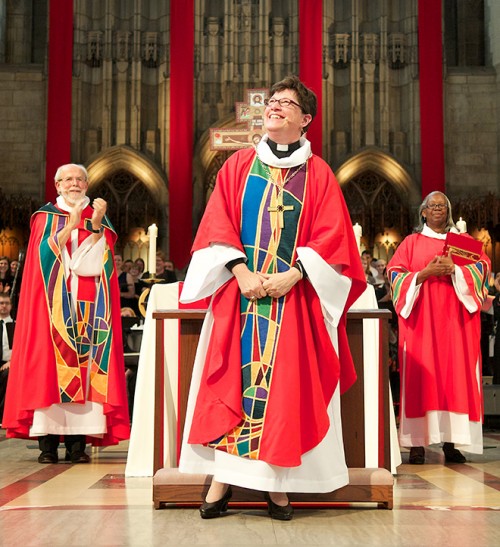A common refrain among converts to Roman Catholicism is a lament about the sorry state of Protestantism, especially the mainline Protestant churches. Betsy Fox Genevose spoke for many when she described the lack of Christianity she had experienced while growing up a Protestant:
Throughout my non-churchgoing, non-believing adult years, I had always considered myself a Christian in the amorphous cultural sense of the world. Having been reared on the Bible and Protestant hymns, I was conversant with the language and basic tenets of Christianity. I had, moreover, been reared with a deep respect for the great Hebrew prophets, assorted Protestant leaders and Catholic saints, and even the unique value of Jesus Christ as the preeminent exemplar of loving self“sacrifice. Never, I am grateful to say, did I, like too many secular intellectuals, denigrate or disdain believing Christians, whom I had always been inclined to regard with respect. But for long years, I did not give much thought to joining their number.
So why is it that the communion that was supposed to elevate former Protestants and give them a better grade of faith is entering into ecumenical discussions with one of the churches, mainline Lutherans, that sent Protestants in search of witness firm on sex and the body?
Nearly 500 years after Martin Luther nailed his 95 theses to the Castle Church door, the largest Lutheran denomination in the U.S. has approved a declaration recognizing “there are no longer church-dividing issues” on many points with the Roman Catholic church.
The “Declaration on the Way” was approved 931-9 by the 2016 Evangelical Lutheran Church in America Churchwide Assembly held last week at the Ernest N. Morial Convention Center in New Orleans.ELCA Presiding Bishop Elizabeth A. Eaton called the declaration “historic” in a statement released by the denomination following the Wednesday vote.
That’s right. A female bishop welcomed the news of entering into closer relations with church that will not ever ordain women.
But some Roman Catholics are not happy (the unhappy Lutherans are already in a different synod — LCMS):
The ecumenical drive has been part of the check-list of popes before the current pontiff. The joint worship service has been described by both the Vatican and the Lutheran World Federation as a “commemoration” rather than a “celebration” in order to avoid further controversy. Some Catholics, especially traditionalists, have criticized the prospect of a pope celebrating a schism. Another issue that has traditionalist Catholics and some clerics baleful is the issue of the differing theologies held by the Catholic Church and Lutherans regard the nature and the confection of the Eucharist.
On the upside, Betsy Fox Genovese, who died in 2003, will not have to witness her church’s pursuit of unity with her former church.


Wait — is that Steve Brown on the left?
LikeLike
cw, wouldn’t Steve have a cigarette workin’?
LikeLike
No, he would be working on his pipe. Wonder what the obedience boys would think of that?
LikeLike
She wasn’t the wife of the late historian, Eugene Genovese, was she? If so- then, I am kind of bummed…
So thankful for Romans 3:9-31, which so clearly and so simply cuts through all the fog.
LikeLike
Chuck, Betsy and Gene were a formidable couple.
LikeLike
Noooooooo….! Although, I will grant they were excellent historians. Formidable indeed!
LikeLike
This sounds like the ELCA:
LikeLike
This sounds like the PCUSA:
LikeLike
But Darryl, the dogma hasn’t changed right? It’s on paper in a musty vault in the Vatican and a couple of RCs around these parts still believe it, so all’s good. Nothing to see here.
LikeLike
Is that Al Franken’s other sister in the middle? http://i.imgur.com/fMoj3jD.jpg?1
LikeLike
Brad, that’s Mark Shea.
LikeLike